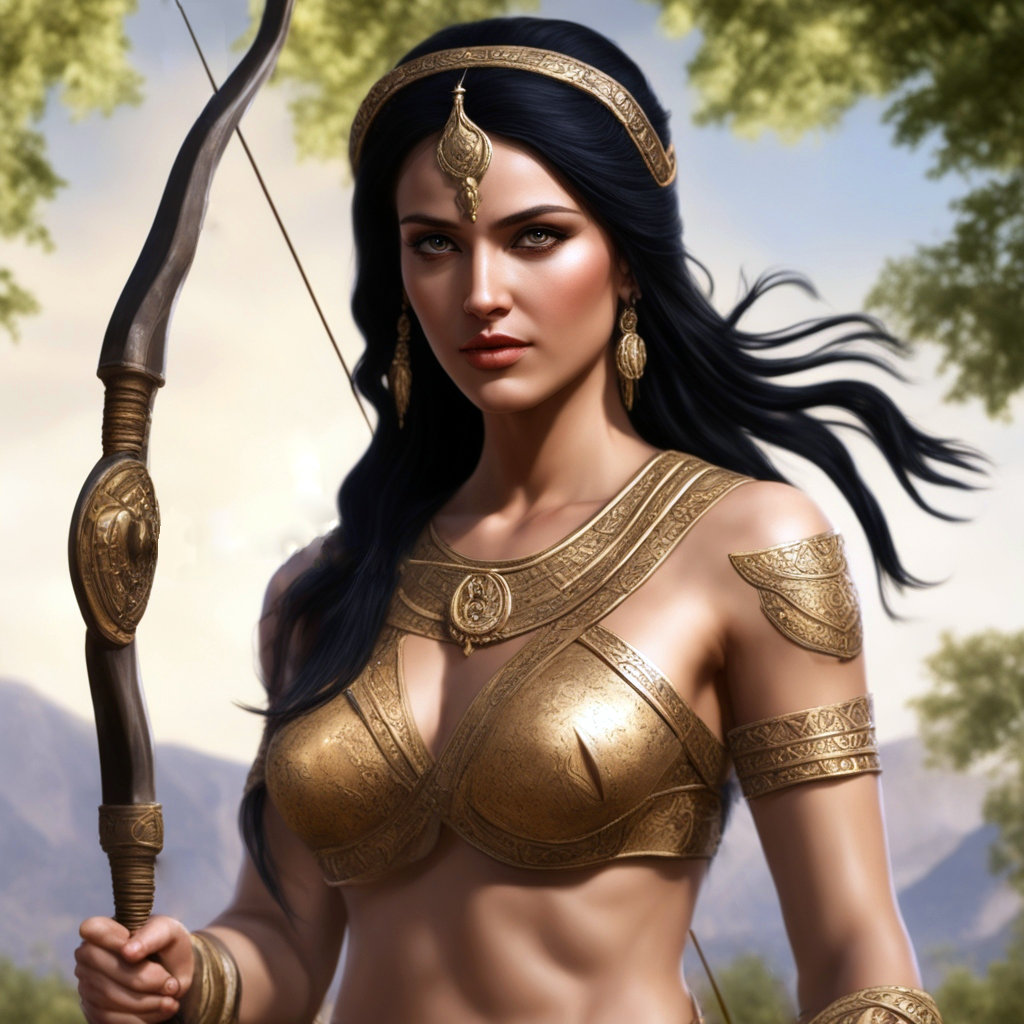 Inanna's Appearance
Inanna's Appearance
Inanna is the Sumerian goddess of love, war and sexuality. She is described as extremely attractive and seductive. As the goddess of war, she is sometimes depicted with a bow and arrow. Her appearance is thus reminiscent of that of an Amazon. Inanna is the daughter of Nanna, who in turn is the son of Enlil. Inanna, who is younger than Nanna and Enlil, is therefore depicted as a 25-year-old woman.
 Inanna's Personality
Inanna's Personality
Inanna is considered ambitious and strives for political power. She is passionate and seductive and uses this to seduce and influence the Sumerian kings and gods. She is also a brave warrior who is prepared to fight for what she wants. She is an independent goddess who goes her own way and does not allow herself to be dominated by others. She is considered capricious and unpredictable, especially when she is rejected by others.
 Inanna's Duties as a Goddess
Inanna's Duties as a Goddess
As the goddess of love and sexuality, Inanna promotes and protects romantic love and desire. She is a goddess to whom lovers pray to bless and strengthen their relationships. She is also responsible for human fertility and is worshipped by couples who wish to have children. She is worshipped as the defender and patron of cities where temples have been built for her. She is invoked to ensure good harvests and prosperity for the population. As the goddess of war, she is a patron of those who go into battle. She is involved in political intrigues and power struggles, but pursues her own goals. She plays a central role in legitimizing the rule of kings. Rulers pray to her to strengthen and legitimize their power and authority.
 The Career of Inanna
The Career of Inanna
In the myth of Nanna and Ningal, Inanna is born as the daughter of the moon god Nanna and the dream interpreter Ningal. Her brother is Utu, the god of the sun. In this myth, Inanna's future as a goddess is prophesied:
Inanna first becomes goddess of the city of Uruk. The myth Inanna and An tells how, as one of her first acts, she brings the temple of E-ana from heaven to earth, to Uruk. She had initially slept with An in the hope that he would give her the temple E-ana in return. Since An did not do this, she stole the temple from him. An finally came to terms with this and instructed Inanna to make the people numerous.
In the myth Inanna and Enki, Inanna then undertakes a journey to Eridu in order to seduce the god Enki and receive the divine powers (Me) from Enki in return. This endeavor was ultimately successful and she was able to use the divine powers to increase the wealth of Uruk.
Later, in the myth The Courtship of Inanna and Dumuzi, Inanna marries the shepherd god Dumuzi, who then becomes king of Uruk. As a shepherd god, Dumuzi had the ability to ensure that Uruk was supplied with food.
In the myth Enki and the World Order, Inanna is described as the wife of Dumuzi, the god of shepherds. She is described as the possessor of all great divine powers (Me) and as the goddess of the city of Uruk, who called people to copulate in the open squares of Uruk. Elsewhere in this myth, the god Enki says of Inanna:
In the myth Inanna's Descent to the Netherworld, Inanna presumably tries to extend her influence to the netherworld, but this endeavor fails and she loses her husband Dumuzi. Shortly afterwards, or in the meantime, the Flood takes place, which is described in The Epic of Atrahasis.
After the Flood, one of Inanna's first acts in The Myth of Etana is to appoint Etana king of Kish, the first city to be rebuilt after the Flood.
Inanna remains goddess of Uruk, but she also extends her sphere of influence to other cities, such as the mythological city of Aratta. This gives her conflicts of interest when the cities wage war against each other. This becomes clear in the myth Lugalbanda and the Anzu bird.
After the Flood, Inanna planted the Huluppu tree, which had been uprooted in Eridu, in her garden. Around 2600 BCE, during Gilgamesh's lifetime, the magical Huluppu tree, which connected the earth with the world of the gods, had fulfilled its purpose. In the myth Inanna and the Huluppu Tree, Inanna has the tree felled by Gilgamesh to make her magical wedding bed, in which the sacred wedding of the kings with Inanna was to take place. This time marks the transition between the time before, when the gods incarnated and ruled as kings, and the time after, when humans ruled as kings under Inanna's guidance.
Inanna planned to establish the kingdom of the gods on earth and had her residence built in a cedar forest. When this project was jeopardized, she offered Gilgamesh to rule as her husband over the kings and princes on earth. Gilgamesh did not believe her and refused, making an enemy of Inanna. This is described in The Epic of Gilgamesh. Gilgamesh thus caused Inanna's plan to establish the kingdom of the gods on earth to fail.


